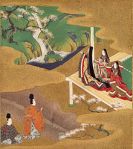Tagged: Fumiko Enchi
Detailing a Genre
Never satisfied with getting involved with just one author at a time, I started Murasaki Shikibu’s The Tale of Genji last night. It’s a work about which I know very little, but which I’ve been wanting to read ever since checking out Fumiko Enchi’s Masks; that latter novel’s grounding in Noh means that it also looks to Murasaki’s tale, which provided Japanese theater with a number of characters.
Genji has a fan base that’ll root for its claim to the title of world’s first novel– and, having only read a couple of chapters so far, I’m going to comment not on this particular novel itself, but on its translator’s thoughts on that literary form. Edward G. Seidensticker gives a go at defining the genre “as the form of prose narrative in which the emphasis is upon characterization rather than upon plot–on believable characters in believable relationships.”* Fine as that goes, I suppose, but it seems you’d have to dismiss a gigantic slew of bad fiction from the category “novel” if that’s your only criterion.
Odder to my mind is the assertion Seidensticker makes on the next page. After letting us know how difficult it was to deal with Genji‘s intricate means of referring to characters in lieu of just giving them names, the translator tells us that “[t]he Western tradition requires that fictional characters have solid, unshakable names.”** Maybe Seidensticker just didn’t want to go into how very different Genji‘s methods are from “the Western tradition’s,” but as presented, I wondered how he could make such a statement in 1984, in the wake of, say, Nathalie Sarraute or other “experimental” writers. And the practice of being not quite forthcoming or obvious with character-handles won’t even cause a novel-reader to raise an eyebrow these days. Have we smashed “the Western tradition” to bits, then, in the last few decades– or did Seidensticker just want to make a point about the difficulty of translating this particular book without getting led down a bunch of unnecessary literary side alleys?
Maybe once I’ve finished this classic, I’ll be able to relate a bit better to its translator’s claims. But for now, I’ll sit with my skepticism, and hole up with the tale he’s made it possible for me to understand.
* Murasaki Shikibu, The Tale of Genji, transl. Edward G. Seidensticker (New York: Vintage Classics, 1990), xiv.
** ibid., xv.
